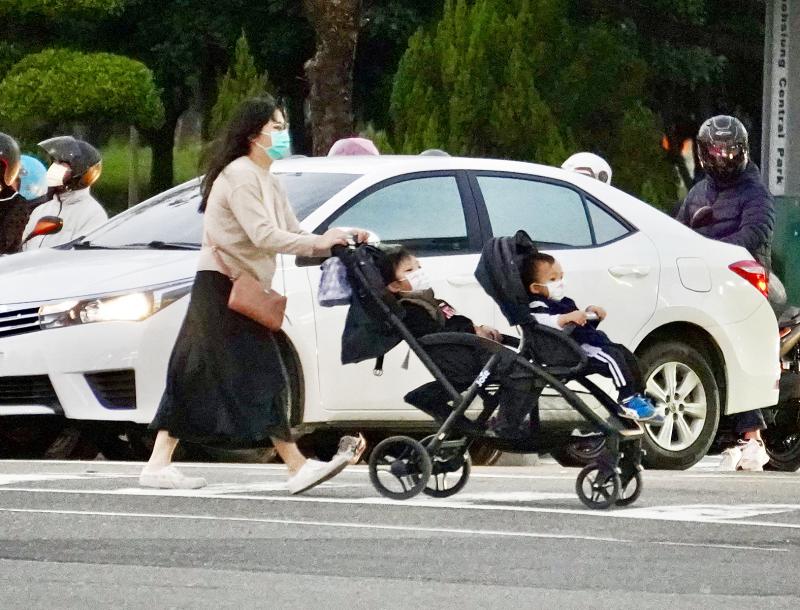The nation’s population last year dropped by an average of 509 people per day amid a record low number of births, with estimates predicting that the population might dip below 15 million in 50 years.
The population last year dropped by 185,922 from 2020 to 23.38 million, data released on Monday by the Ministry of the Interior (MOI) showed.
Only 153,820 births were recorded in the entire year, setting a record low and dipping below the death rate each month.

Photo: CNA
Last month, there were only 14,127 births, 19.5 percent fewer than the number recorded a year earlier.
Although the COVID-19 pandemic, economic fears and auspicious timing were expected to affect births, the figure is even lower than forecast, a National Development Council official said.
“The numbers are not optimistic,” the official added.
If the trend continues, the nation would be looking at the lower end of its population projection, the official said.
According to the most pessimistic of the council’s biannual projections released in August 2020, the population would only total 14.49 million by 2070.
This would spell trouble for the nation’s care burden, as the dependency ratio would climb to 102 percent from about 41 percent last year, meaning there would be one dependent for every working-age adult.
In an interview last year, National Taiwan University sociology professor James Hsueh (薛承泰) said that comparing population data from 2000 with estimates for 2040 shows a starkly different composition.
Although the population is about 22 million for both years, by 2040, the nation would be facing the dual challenge of a population that is both aging and shrinking, Hsueh said.
The COVID-19 pandemic has also dealt a blow to population numbers, with 2020 seeing the first decline since 2003, as those who have not returned to the country in two years are automatically labeled as having moved abroad.
However, the ministry advised that losing residency is not the same as losing citizenship, and it expects an increase in returnees once the pandemic eases.
Experts are also not optimistic about the birthrate this year, considering that the Year of the Tiger is an inauspicious year for births and marriage registrations last year also hit a new low of 114,606.
The birthrate would remain stable, Hsueh said, but due to the declining overall population, the total number of births would also decline.
The CIA in its World Factbook placed Taiwan at the tail end of its estimated fertility rate for last year at only 1.07 births per childbearing person, coming in just behind four other Asian countries or regions among a total of 227.
Additional reporting by Aaron Tu

A preclearance service to facilitate entry for people traveling to select airports in Japan would be available from Thursday next week to Feb. 25 at Taiwan Taoyuan International Airport, Taoyuan International Airport Corp (TIAC) said on Tuesday. The service was first made available to Taiwanese travelers throughout the winter vacation of 2024 and during the Lunar New Year holiday. In addition to flights to the Japanese cities of Hakodate, Asahikawa, Akita, Sendai, Niigata, Okayama, Takamatsu, Kumamoto and Kagoshima, the service would be available to travelers to Kobe and Oita. The service can be accessed by passengers of 15 flight routes operated by

Alain Robert, known as the "French Spider-Man," praised Alex Honnold as exceptionally well-prepared after the US climber completed a free solo ascent of Taipei 101 yesterday. Robert said Honnold's ascent of the 508m-tall skyscraper in just more than one-and-a-half hours without using safety ropes or equipment was a remarkable achievement. "This is my life," he said in an interview conducted in French, adding that he liked the feeling of being "on the edge of danger." The 63-year-old Frenchman climbed Taipei 101 using ropes in December 2004, taking about four hours to reach the top. On a one-to-10 scale of difficulty, Robert said Taipei 101

MORE FALL: An investigation into one of Xi’s key cronies, part of a broader ‘anti-corruption’ drive, indicates that he might have a deep distrust in the military, an expert said China’s latest military purge underscores systemic risks in its shift from collective leadership to sole rule under Chinese President Xi Jinping (習近平), and could disrupt its chain of command and military capabilities, a national security official said yesterday. If decisionmaking within the Chinese Communist Party has become “irrational” under one-man rule, the Taiwan Strait and the regional situation must be approached with extreme caution, given unforeseen risks, they added. The anonymous official made the remarks as China’s Central Military Commission Vice Chairman Zhang Youxia (張又俠) and Joint Staff Department Chief of Staff Liu Zhenli (劉振立) were reportedly being investigated for suspected “serious

Taiwanese and US defense groups are collaborating to introduce deployable, semi-autonomous manufacturing systems for drones and components in a boost to the nation’s supply chain resilience. Taiwan’s G-Tech Optroelectronics Corp subsidiary GTOC and the US’ Aerkomm Inc on Friday announced an agreement with fellow US-based Firestorm Lab to adopt the latter’s xCell, a technology featuring 3D printers fitted in 6.1m container units. The systems enable aerial platforms and parts to be produced in high volumes from dispersed nodes capable of rapid redeployment, to minimize the risk of enemy strikes and to meet field requirements, they said. Firestorm chief technology officer Ian Muceus said